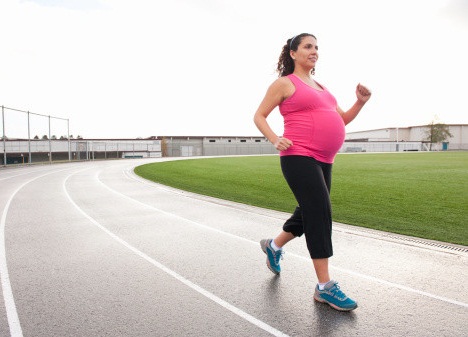Thanks to some promising research over the last few decades, more and more women are aware of the benefits of exercise during pregnancy. Regular cardio exercise has plenty of benefits for both your pregnant body and your baby. It strengthens muscles and increases pulmonary function, letting the body breathe in more oxygen. It strengthens the muscles of the heart. Plus, a good cardio workout always leaves one with an energetic and cheerful mental attitude towards everything in life, which is very important for the healthy growth of the baby. Regular exercise offers benefits of reduced risk of diabetes and preeclampsia, to easier labors, to healthy and thriving babies, these studies are pretty conclusive. It will be exciting to see what future research has to tell us about how exercise affects mothers and babies on all levels.
Current Recommendations about Pregnancy and Aerobic Exercise
The American College of Obstetricians and Gynecologists (ACOG) no longer places restrictions on heart rate during aerobic sessions. Larger, more comprehensive studies on Aerobic exercise during pregnancy have shown that women do not need to limit their Sub maximal heart rate. Complete current ACOG guidelines for exercise during pregnancy can be accessed on their Web site.
Heart Rate and Pregnancy
Apart from morning sickness, pregnant women also face unexplained breathlessness with relatively low-intensity activity. That’s because during pregnancy, a pregnant woman’s blood volume increases by as much as 40 percent. To deal with that increase, the heart volume must also increase by 15 to 20 percent, but that takes some time. As pregnancy goes on, you will probably be able to handle higher intensity exercise much more easily, since the body has adjusted to these changes.
Using a heart rate monitor is not the best indicator of exertion during pregnancy. That’s because your resting heart rate changes pretty dramatically during pregnancy, due to the increase blood volume. You should simply listen to your own body for a stop sign.
Aerobic Exercise in Pregnancy
Today, we know that physically fit moms have healthy pregnancies, and give birth to healthy babies. Numerous scientific studies have shown that, among healthy women, no link exists between moderate to vigorous levels of Aerobic exercise and miscarriage or other pregnancy complications. In fact, fit mothers-to-be who engage in regular Cardiovascular exercise have substantially lower incidences of back pain, gestational diabetes, depression, labor interventions, caesarian births, and other problems associated with pregnancy.
Benefits of Aerobic Exercise During Pregnancy
1. When you are fit, you’re more likely to give birth to a leaner baby.
2. With regular Aerobic exercise , the size of the Placenta increases, and so does its capacity to exchange oxygen and CO2, and nutrients and waste products.
3. Babies born to fit moms have greater cardiovascular capacity from the start.
4. Lean babies are less likely to become overweight or develop diabetes as adults.
5. If you breastfeed, improved immune function will carry over to your baby for the first several months of life.
6. Prevents excessive weight gain during pregnancy, which reduces both your risk of gestational diabetes and your baby’s risk of developing diabetes as an adult.
7. Fit moms bounce back into shape after delivery much more quickly than sedentary women.
8. Provides needed stamina for labor and delivery.
Best Aerobic Activities during Pregnancy
 – Fitness walking
– Fitness walking
– Low-impact aerobic classes
– Treadmill
– Elliptical trainer
– Swimming
– Aqua aerobics
NOTE: Jogging may need to be replaced with a lower-impact exercise in the last trimester.
Exercises To Avoid
Regardless of your experience level, all pregnant women should avoid cardio that puts them at risk for jerks, a major collision or fall, such as horseback riding, biking and contact sports. Be extra careful about activities that require plenty of balance and coordination like step aerobics; as your belly grows, it throws off your center of gravity, making you more prone to spills
Limitations
It’s especially important not to push your body too hard during exercise. To keep yourself within safe limits, check yourself frequently during cardio; using the rate of perceived exertion, or exercise under the supervision of a trained antenatal expert recommends FabMoms. You should be breathing more heavily than usual but still be able to talk. Finally, take care not to let yourself get overheated.
Safety
No matter which form of cardio you choose, be sure every workout includes a warmup, cooldown and a few minutes of stretching before and after exercising. Take plenty of breaks, hydrate yourself before, during and after your workout and listen to your body; if you’re exhausted after 15 minutes, cool down and try again tomorrow. If you feel dizzy, short of breath or experience vaginal bleeding or pain of any kind, stop exercising immediately and call your doctor if the symptoms don’t go away.
